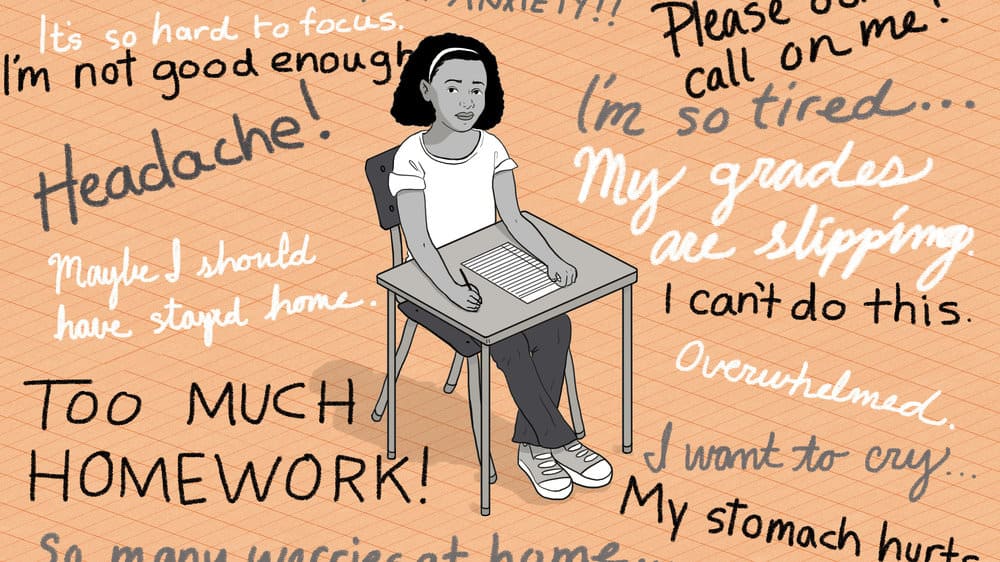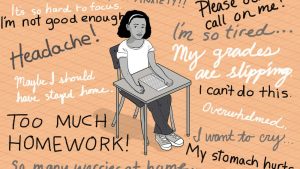In 2019, the Government of Pakistan embarked on a commendable initiative to address the pressing issue of mental health among school children. A comprehensive online training course was introduced as part of a 5-year initiative recognizing the pivotal role of teachers in shaping the socio-emotional development of students. The pilot phase in 2020 yielded positive results, showcasing improvements in teachers’ knowledge and skills, identification of at-risk groups, and the training of school counselors to provide crucial psychosocial support.

However, as we delve into the complexities of the education system in Pakistan, it becomes apparent that the mental health challenges faced by students demand urgent attention. In this article, we aim to explore the existing scenario of mental health issues among school students and propose effective strategies to address and alleviate this dilemma.
Root Causes of Mental Health Issues among Students
A myriad of factors contribute to the mental health challenges faced by school students in Pakistan. In February 2023, a sixth-grade student tragically took her own life by jumping from the third floor of a private school in Hyderabad. Likewise, in May 2023, another distressing incident occurred when a student from Swat committed suicide. According to the sources, the boy was deeply troubled by his exam performance. These incidents underscore the urgency of addressing the root causes of mental health issues among students.

The lack of adequate career counseling platforms increases the emotional toll on students who find themselves struggling in an environment that prioritizes exam scores over individual growth. In addition, the relentless pursuit of becoming a doctor or engineer, coupled with the intense competition and limited seats, places an enormous burden on students. The high stakes of exams such as MCAT and ECAT lead to increased stress, anxiety, and, in some tragic cases, even suicide.
In schools, a prevailing culture of rote learning prevails, neglecting the essential aspects of personality and skills development. Students face humiliation for low exam scores instead of receiving guidance to overcome challenges.
Implications of Mental Health Issues
The far-reaching consequences of unaddressed mental health issues among students are starkly highlighted by alarming statistics, revealing a 23.5% suicide rate linked to intense academic pressure. It highlights the immediate and urgent need to prioritize the mental well-being of students.
The current education system significantly worsens these challenges by putting too much focus on academic success, often neglecting the overall development of students. The constant push for top exam scores takes center stage, leaving little space for fostering the unique personalities and skills of each student.
Furthermore, teachers, facing immense pressure to achieve high exam results, unintentionally also contribute to this harmful cycle by overlooking the diverse needs of students. The impact goes beyond academics, causing a loss of self-esteem and identity. Tragically, in extreme cases, these unaddressed mental health issues can lead to devastating outcomes such as suicide.
Recommendations for Tackling the Dilemma
Mental illness among school students is a significant concern that deserves urgent attention. The pressures of academic performance, social dynamics, and personal expectations can contribute to various mental health challenges. Anxiety, depression, and stress are common issues that students may face, impacting their overall well-being. In this scenario, schools must adapt to the practices that can reduce the mental health issues of students. Some significant steps include:

1.Comprehensive Guidance and Counselling:
Implementing a robust system of guidance and counseling in educational institutions is crucial. This involves addressing the mental health concerns of students before and after exams, offering timely advice on alternative career paths, and providing a supportive environment for students to discuss their challenges.
2.Integration of Mental Health Education:
Integrate mental health education into the curriculum to equip students with coping mechanisms, stress management skills, and resilience. This proactive approach can foster a positive mindset and help students navigate the complexities of adolescence more effectively.
3.Increased Availability of Mental Health Professionals:
Collaborate with relevant stakeholders to increase the availability of mental health professionals within the school system. This ensures timely intervention and support for students in need.
4.Parental Education and Involvement:
Educate parents about the importance of mental health, warning signs to look for, and available resources. Creating a collaborative network between schools and parents can provide holistic support to students.
5.Media Campaigns and Seminars:
Launch media campaigns and seminars to raise awareness about mental health issues. By dismantling the stigma surrounding mental health, society can become more accepting and supportive of those facing challenges.
The Way Forward
The mental health crisis among school students in Pakistan is a complex and deteriorating issue. The government’s initiative to train teachers is a commendable step, but a more comprehensive approach is needed. By integrating mental health education into the curriculum and fostering collaboration between schools, parents, and mental health professionals, we can create an environment that values the mental well-being of students. It is an educational imperative and a societal responsibility to ensure that the future leaders of Pakistan grow in an environment that nurtures their mental health and well-being. The time to act is now, and by doing so, we invest in a healthier and more resilient generation.
Disclaimer: Any opinions expressed in this article do not necessarily reflect the opinions of the Pakistan Education Review. This content is meant for informational purposes only.







